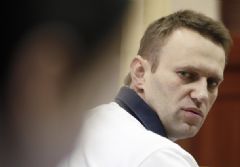Human Rights Voices
While the UN devotes its human rights operations to the demonization of the democratic state of Israel above all others and condemns the United States more often than the vast majority of non-democracies around the world, the voices of real victims around the world must be heard.
Russia, July 19, 2013
Russian Court Convicts Anti-Corruption Crusader Alexei Navalny
Original source
Russia's most effective anti-corruption campaigner and opposition leader was found guilty of embezzlement Thursday and sentenced to five years in prison in a verdict that sent shock waves throughout the country.
The conviction of Alexei Navalny, 37, a leading critic of President Vladimir Putin with a penchant for exposés and cutting jibes, brought condemnation from those who view the case as politically driven. Opponents said it showed that Putin recognizes few bounds in his determination to crush challengers.
Michael McFaul, the U.S. ambassador to Russia, posted on Twitter: "We are deeply disappointed in the conviction of Navalny and the apparent political motivations in this trial."
A statement released by the office of the European Union's foreign affairs chief, Catherine Ashton, said, "This outcome, given the procedural shortcomings, raises serious questions as to the state of the rule of law in Russia."
Even before the conviction, U.S.-Russian relations had turned increasingly brittle. White House officials said Thursday that President Obama's scheduled September trip to Moscow to meet with Putin is in limbo because of uncertainty surrounding Edward Snowden, the fugitive National Security Agency contractor who fled to Russia and is seeking asylum there.
The conviction and sentencing of Navalny were based on old charges that Russian prosecutors had previously declined to pursue. The outcome ignited an unsanctioned rally in the center of Moscow, where by evening a crowd of several thousand had gathered along the sidewalks of streets leading toward Manezh Square.
Navalny's case has been the most prominent in a series of criminal prosecutions that Russian authorities have launched against their critics since the outbreak of political protest in late 2011 - much of it led by Navalny.
The anti-corruption blogger had emerged at the head of an opposition movement that represented the sharpest challenge in years to the hold that Putin and his allies have maintained over Russian politics.
But Navalny and others quickly became the targets of a serious crackdown that Putin launched after he returned to the presidency in May 2012, with demonstrators arrested, laws passed to limit protests and some nongovernmental organizations required to register as foreign agents.
Even before his trial began in April in Kirov, a city about 550 miles northeast of Moscow, Navalny said he expected to be convicted on what he and his supporters contended were trumped-up charges. But Navalny had been hoping for a suspended sentence, in the belief that the Kremlin would want to avoid a backlash if it appeared too harsh.
As he was led into custody, it became clear that those in power in Russia have chosen not to be subtle as they crack down on the opposition. "I think the protest is going to a different level," said Denis Maslov, a 31-year-old auditor who turned out for the Moscow rally. "People who are willing to change Russia for the better end up in jail. That's why I'm here."

